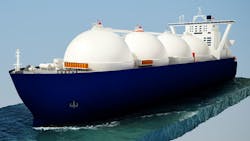Federal, state and local permitting reviews of new facilities needed to increase exports of liquid natural gas and coal may run afoul of U.S. obligations under international trade agreements, a new study finds.
Both LNG and coal are now in abundant supply in the U.S., and demand in China and other countries for these resources is growing. Coal provides 70% of the energy consumed in China, the study notes, and more than 395 gigawatts of new coal-fired power generation is planned worldwide by 2016. U.S. natural gas prices are less than half those of Europe, the study points out, and as little as a quarter of prices in Asia.
Global demand is prompting a variety of efforts in the United States to export more coal and natural gas, but NAM officials warn a “persistent pattern” of regulatory delay for energy-related projects such as the Keystone XL pipeline is hampering the U.S. economic rebound and competitiveness.
“We have a unique opportunity to impact global trade and create jobs in the energy space,” said Aric Newhouse, NAM senior vice president of policy and government relations, in a conference call with reporters. He said every delay of months or years in permitting energy infrastructure projects “threatens our ability to grow jobs in this country and threatens our ability to grow the economy.”
The study by former WTO Appellate Body Chairman James Bacchus, commissioned by the National Association of Manufacturers, examines two issues:
- Do unreasonable delays by the Department of Energy to issue licenses to export LNG to foreign countries constitute, in and of itself, a violation of our international obligations under the WTO?
- Do efforts by state and local authorities in the Pacific Northwest to broaden unduly the scope of the environmental review process for planned coal export terminals beyond the federal scope, and the resulting delay, constitute a violation of our international obligations under the WTO?
To export LNG, companies must obtain an export license from the U.S. Department of Energy that governs the amount of LNG and the time period for export. The Federal Energy Regulatory Commission regulates the siting, construction and operation of LNG export facilities.
The U.S. government has approved five export licenses and is considering 19 more. The first license took several months for approval, while the next four were pending for more than 2 years before they were approved.
“Given that each project can take 5 years or more from the DOE’s approval to export, the current backlog of LNG export applications and the delay in approval translate to real economic costs,” the report states. It says delays could extend projects “beyond the window of economic opportunity,” particularly in light of competing projects being planned in Canada, Australia and Africa.
Federal law does not restrict coal exports, but new port facilities are needed to export coal mined in Montana and Wyoming to Asian markets. The study found that while environmental impact reviews for the marine terminals by the Army Corp of Engineers will be limited to the local impact of the terminals, state and local reviews will be more expansive. They will look at the impact of increased train traffic and the impact of burning coal in other parts of the world. The draft environmental studies will take 2 years to complete. Supporters of the projects worry that the expanded scope of the studies will cause delays “well beyond what is customary or reasonable.”
Lengthy delays in issuing license or export approvals may violate Article XI:1 of the General Agreement on Tariffs and Trade. The study points out that in a prior case involving Japanese export restrictions on semiconductors, “a GATT panel found that delays of up to three months” in issuing export licenses violated the GATT rule.
The study acknowledges that a case could be made for new coal exports having an impact on human health in the immediate areas of the terminals, but it said the U.S. would be on shaky grounds regarding effects in China or globally.
“China is a large producer of coal itself and is not dependent on coal from the United States,” it states. “Given this, it may be difficult to show that coal exports from the United States will have a material impact on the coal consumption or emissions from China.”
Looking at these and other aspects of the trade law, the study found that “the implementation of U.S. rules in ways that unnecessarily impede exports of LNG and coal and are likely to violate WTO rules forbidding export restrictions.”
NAM’s Newhouse said the study provides “a clear wakeup call” to policymakers in Washington and in the Pacific Northwest that “now is the time to act.”
About the Author
Steve Minter
Steve Minter, Executive Editor
Focus: Leadership, Global Economy, Energy
Call: 216-931-9281
Follow on Twitter: @SgMinterIW
An award-winning editor, Executive Editor Steve Minter covers leadership, global economic and trade issues and energy, tackling subject matter ranging from CEO profiles and leadership theories to economic trends and energy policy. As well, he supervises content development for editorial products including the magazine, IndustryWeek.com, research and information products, and conferences.
Before joining the IW staff, Steve was publisher and editorial director of Penton Media’s EHS Today, where he was instrumental in the development of the Champions of Safety and America’s Safest Companies recognition programs.
Steve received his B.A. in English from Oberlin College. He is married and has two adult children.
